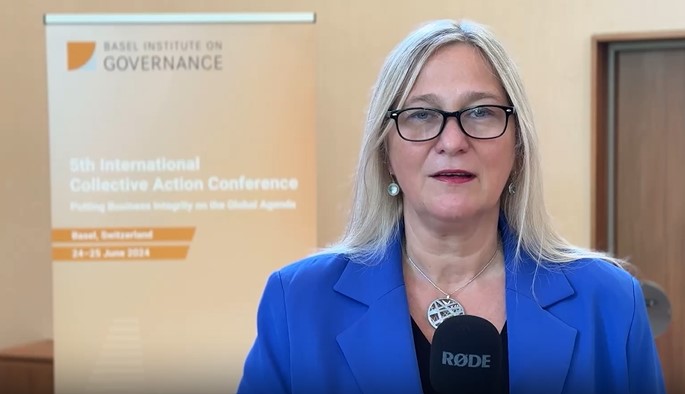How do SMEs and business associations benefit from anti-corruption Collective Action?

An entrepreneur and vocal supporter of anti-corruption Collective Action, Norwegian-born Vibeke Lyssand Leirvag has two interesting perspectives: as a small business owner in Thailand and as Chairwoman of the Joint Foreign Chambers of Commerce.
In this short interview on the sidelines of the Basel Institute’s International Collective Action Conference, Vibeke explained how engaging in a Collective Action initiative can help make the voice of business – whether an SME or a Chamber of Commerce – heard in matters of business integrity and fair competition.
“I'm from Norway originally, but I have been in Thailand for 35 years. I own a jewellery manufacturing company called Felicia Design, where we have 150 workers – I would consider that we are the M in SMEs. I'm also the chairwoman of the Joint Foreign Chambers of Commerce in Thailand, representing 36 chambers and around 9,000 companies, where 80 percent are SMEs.
Value of Collective Action for SMEs
I feel that Collective Action is extremely important for SMEs. First, it gives SMEs a voice. It gives them a platform and a network where they can communicate their challenges. And second, being in a collective network gives SMEs access to tools and opportunities.
As an example, in Thailand, we have the Thai Coalition Against Corruption (Thai CAC), which offers clinics that train staff on the ground. We also have an “OECD regulations toolkit”, which is very helpful to SMEs.
To engage in Collective Action and work towards zero corruption requires finances. Very often SMEs will look at anti-corruption compliance as a cost. To me, it is not a cost. I think you invest in what is right. You invest in ethics and a good moral compass. And that will actually create opportunities.
How business associations can benefit
For the Joint Foreign Chambers of Commerce, Collective Action gives us a platform to have influence and to speak with the government.
It gives us a platform to make sure that the policies that are put in place are actually functional. In other words, that these are policies that businesses can work with – both larger corporations and SMEs.
So I think Collective Action is effective, and I think it's very important that we make sure government, civil society, private sector and academia work together.”
Learn more
- See more Q&As with leading voices in promoting anti-corruption Collective Action, together with photos and videos, on the web page of our 2024 International Collective Action Conference.
- Learn more about Collective Action and how to engage on the B20 Collective Action Hub.


